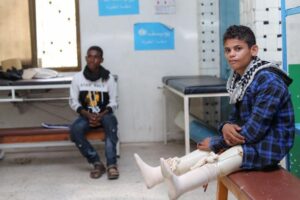
Yemen, ospedale di Aden: bambino con le protesi agli arti inferiori. Tra luglio e settembre 2022 almeno 74 bambini sono rimasti uccisi o gravemente feriti dalle mine antiuomo o da altri ordigni o armi (informazioni e foto Unicef) .
Otto anni di sanguinosa guerra civile nello Yemen, uno dei paesi più poveri del mondo. I dati delle vittime sono quelli verificati dalle Nazioni Unite. La Direttrice dell’Unicef, Catherine Russell, ha lanciato, il 12 dicembre scorso, un drammatico appello affinché si rinnovi urgentemente la tregua di sei mesi scaduta. La crisi umanitaria è gravissima: 24 milioni di persone (i tre quarti della popolazione), di cui la metà minori, hanno necessità di assistenza e di protezione. Altissimo è il rischio di epidemie per la carenza di vaccinazioni.
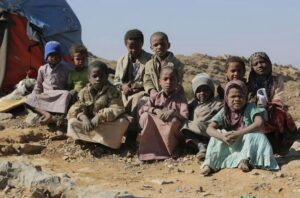
Yemen, bambini in un campo profughi (Oxfam / Mohammed Al-Mekhlaf)
Pubblichiamo il testo in inglese tratto dal sito ufficiale dell’Unicef. Lo facciamo precedere da questa nostra sintesi in italiano.
Più di 11. 000 bambini uccisi o feriti in Yemen
Più di 11.000 minori sono rimasti uccisi o feriti (soprattutto mutilati) a causa del conflitto in Yemen. Una media di 4 al giorno dal 2015, da quando la guerra civile ha conosciuto una drammatica escalation.
Si tratta delle vittime verificate dalle Nazioni Unite (l’Unicef – United Nations International Children’s Emergency Fund – è un organismo delle Nazion Unite), ma probabilmente sono di più.
Nonostante la tregua in atto, molte sono ogni giorno le vittime causate dalle mine antiuomo e da altri ordigni o armi. Tra di loro molti i bambini.
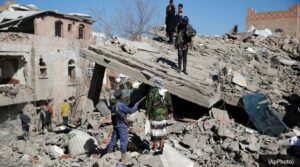
Yemen, le distruzioni della guerra civile.
Dopo quasi otto anni di guerra, più di 23,4 milioni di persone, tra cui 12,9 milioni di minori, sono bisognosi di assistenza umanitaria e di protezione. Tre quarti dell’intera popolazione.
Si stima che 2,2 milioni di minori siano gravemente malnutriti; 540.000 bambini sotto i cinque anni soffrono gravemente la fame e sono a rischio di sopravvivenza.
La Direttrice esecutiva dell’Unicef, Catherine Russell, dopo una visita in Yemen, ha chiesto alle parti in conflitto di rinnovare urgentemente la tregua di sei mesi scaduta. Ha ricordato che mentre migliaia di bambini hanno perso la vita in Yemen, altre centinaia di migliaia rimangono a rischio di morte.
Solo la metà delle strutture sanitarie funziona.
Il 28% dei bambini sotto un anno non sono regolarmente vaccinati e questo, unitamente al fatto che milioni di persone non hanno accesso all’acqua potabile, li espone a gravi rischi di infezione per i persistenti focolai di colera, difterite, morbillo e di altre malattie che potrebbero essere evitate con la vaccinazione.
Anche il sistema scolastico è gravemente compromesso.
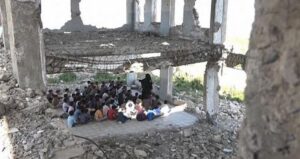
Yemen, 2019, una scuola resiste tra le macerie (foto Hani Mohammed / Associated Press)
L’Unicef è attivamete impegnato nel far fronte a questa gravissima emergenza umanitaria che solo la pace potrà affrontare seriamente. L’organizzazione ha bisogno urgentemente di ulteriori aiuti.
Seguono: l’elenco degli interventi umanitari realizzati nel corso del 2022 e i dati accertati delle vittime del conflitto dal marzo 2015 al settembre 2022.
Dal sito ufficiale www.unicef.org
More than 11,000 children killed or injured in Yemen
UNICEF Executive Director Catherine Russell calls for urgent renewal of truce following visit
12 December 2022
NEW YORK, 12 December 2022 – More than 11,000 children have now been killed or maimed as a result of the conflict in Yemen, according to UNICEF – an average of four a day since the escalation of the conflict in 2015. As these are only the UN-verified incidents, the true toll of this conflict is likely to be far higher.
While the UN-brokered truce led to a significant reduction in the intensity of the conflict, a further 62 children have been killed or injured between the end of the truce at the start of October and the end of November. At least 74 children were among the 164 people killed or injured by landmines and unexploded ordnance between July and September 2022 alone.
Almost eight years since the escalation of the conflict, more than 23.4 million people, including 12.9 million children, are in need of humanitarian assistance and protection – almost three-quarters of the entire population. An estimated 2.2 million children in Yemen are acutely malnourished, including nearly 540,000 children under the age of five suffering from severe acute malnutrition and are struggling to survive.
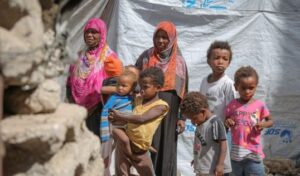
Yemen, profughi.
“For children like 7-month-old Yasin and his mother Saba, who I visited at a hospital in Aden, life has become a struggle for survival,” said UNICEF Executive Director Catherine Russell, who launched UNICEF’s Humanitarian Action for Children Appeal from Yemen last week. “Thousands of children have lost their lives, hundreds of thousands more remain at risk of death from preventable disease or starvation. Yasin is just one of too many severely malnourished children in Yemen. They all need immediate support as basic services have all but collapsed.”
More than 17.8 million people, including 9.2 million children, lack access to safe water, sanitation and hygiene (WASH) services. For years, the country’s health system has been extremely fragile: only 50 per cent of health facilities are functional, leaving almost 22 million people – including around 10 million children – without adequate access to healthcare.
Immunization coverage has stagnated nationally, with 28 per cent of children under 1 year of age missing routine vaccinations. Coupled with the lack of access to safe water, this puts children at extreme risk amid regular outbreaks of cholera, measles, diphtheria and other vaccine-preventable diseases.
At the same time, Yemen is facing a severe education crisis, leading to tremendous long-term consequences for children. Two million children are out of school, and this number could rise to 6 million children having their education disrupted as at least one out of four schools in Yemen are destroyed or partially damaged.
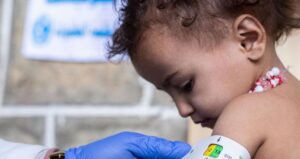
(Foto Unicef)
“If the children of Yemen are to have any chance of a decent future, then the parties to the conflict, the international community and all those with influence must ensure they are protected and supported,” said Russell. “That includes children like Mansour, who I met at a UNICEF-supported rehabilitation and prosthetics centre. His leg was amputated at the knee after he was shot by a sniper. No child should suffer that. The urgent renewal of the truce would be a positive first step that would allow critical humanitarian access. Ultimately, only a sustained peace will allow families to rebuild their shattered lives and begin to plan for the future.”
UNICEF urgently requires US$484.4 million to respond to the humanitarian crisis in Yemen in 2023. Lack of predictable funding for urgent interventions challenges the continuity of key services, putting children’s lives and well-being at risk.
Despite the challenges, in 2022 UNICEF was able to:
- Support the treatment of severe acute malnutrition for more than 260,000 children in 4,584 primary health care facilities and 34 therapeutic feeding centres.
- Provide emergency cash transfers to almost 1.5 million households every quarter — benefitting around 9 million people.
- Provide access to safe and sustained drinking water to 4.7 million people through a wide spectrum of activities including water trucking, the installation of water distribution points, and the expansion of water supply systems to Internally Displaced People’s camps. UNICEF also provides fuel to support the production and distribution of clean water to 36 Local Water and Sanitation Corporations in 15 Governorates.
- Provide vaccination against measles and polio to at least 1.6 million children who have little to no access to primary health care.
- Reach more than 254,000 children and caregivers in conflict-affected areas with psychosocial support, and over 423,000 children and community members with lifesaving mine risk education.
- Reach more than 1.6 million people living in remote rural areas with access to public healthcare centres services.
- Support Mother, Newborn and Child Health (MNCH) services in 24 hospitals providing operational assistance, as well as equipment and supplies. In addition, through the support to 4,500 static Outpatient Therapeutic Programme (OTP) centres and 288 mobile teams, treatment and prevention of malnutrition services were scaled up.
***
Notes for editors:
These are figures that the United Nations has been able to verify. The actual numbers are likely to be much higher. Between March 2015 and 30 September 2022:
- 11,019 children have been either killed or maimed
- 3,774 children killed (2,742 boys; 983 girls; 49 unknown)
- 7,245 children injured (5,299 boys; 1,946 girls)
- 3,995 (3,904 boys recruited into the fighting, and 91 girls are participating on the events or on the checkpoints)
- 672 attacks and military use of education facilities.
- 228 attacks and military use of health facilities.
- 445 children (all boys) detained.
- 152 children abducted (140 boys and 12 girls.)
- 47 children exposed to conflict-related sexual violence (29 boys and 18 girls.)
Media contacts
Joe English
UNICEF New York
Tel: +1 917 893 0692
Email: jenglish@unicef.org
Alix Reboul-Salze
UNICEF Yemen
Tel: +967-712223001
Email: areboulsalze@unicef.org
***
In questo blog vedi anche: